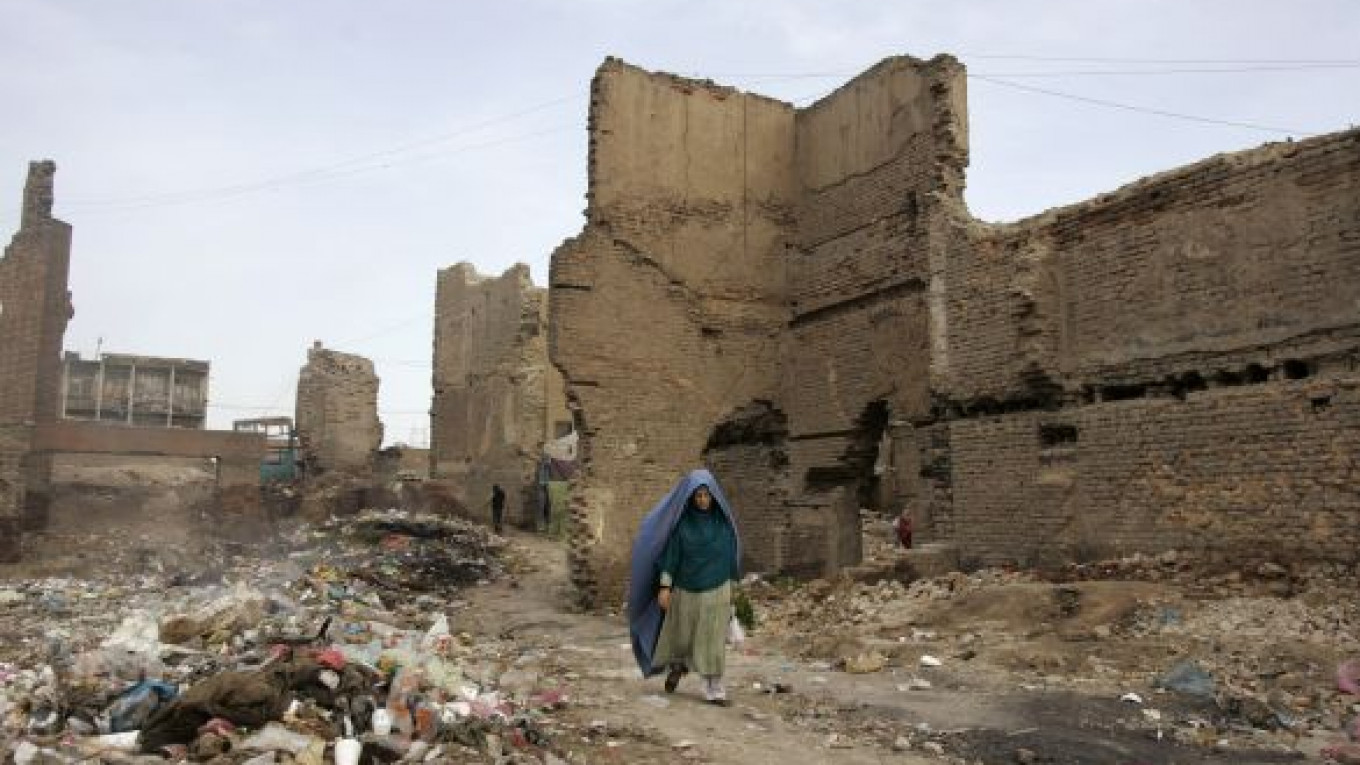KABUL, Afghanistan — Clouds of hashish and cigarette smoke float across a screen showing a dancing Pakistani woman, who evokes yowls of excitement from the hundreds of Afghan men passing their time in one of the capital's rundown cinemas.
Once a treasured luxury for the elite, Afghan film connoisseurs are deeply distressed by the dilapidated state of their cinemas, which reflect an industry on the brink of collapse from conflict and financial neglect.
"Before our audiences were educated. Now they are illiterates who understand nothing of cinema and come only to smoke [marijuana]," said Sayed Khalid Sadat, manager of Pameer cinema, which sits on a corner in the bustling center of Kabul.
Kabul's cinemas show Pakistani films in Pashto, American action films and Bollywood to rowdy, largely unemployed crowds in pursuit of any distraction from their drab surroundings.
It's a far cry from the heyday of Afghan-produced film 40 years ago, when cinemagoers were required to wear suits or evening wear.
Pameer is one of seven cinemas operating in the capital, down from the 23 Kabul boasted before the onslaught of the civil war in 1992, which razed two-thirds of the city. They all charge the equivalent of about $1 per ticket.
Later the Taliban banned cinema, music and television outright during their five-year rule, deeming them un-Islamic and ending a rich tradition in a country that started showing films in the 1920s during the rule of King Amanullah Khan and shot its first movie in Lahore in 1951.
Now Afghan directors are desperately trying to salvage what is left of their industry and its legacy but receive almost no support from the government or abroad.
"We have international forces here and billions of dollars pouring in, but none goes to developing our culture," said Latif Ahmadi, a much-loved film director and head of state-run cinema agency Afghan Film, set up in 1968.
He spoke on its sprawling grounds, home to a hangar, editing suites and hauntingly empty corridors where dusty glass boxes hold the awards Afghan films won at various film festivals, mostly in the Soviet Union.
Before Moscow's disastrous decade-long war in Afghanistan, starting with its invasion in 1979, the Soviets exercised enormous influence in the country, giving large amounts of aid and supporting education and the arts.
Their scholarships and training resulted in a slew of beloved classics produced in the 1970s and 80s.
10 Unfinished Films
The civil war abruptly brought Afghan cinema to an end: Only one film was produced in the 1990s, a 1994 feature celebrating mujahideen fighters' victory over the Soviets.
"We want to have our own Afghan films, we want our cinema to improve," said construction worker Nangyalia, 19, at the Pameer, its concrete walls adorned with Indian film posters with the bellies and shoulders of women blacked out by pen to observe Afghanistan's ultraconservative culture.
Since the Taliban were ousted in 2001 and the NATO-led war began, films using Afghan settings and actors have enjoyed enormous success at home and abroad, such as "Osama" in 2003 and "The Kite Runner" in 2007 but were made with foreign funding.
On its own, Afghanistan has only managed to make a couple of documentaries over the last decade.
The government pays the salaries of Afghan Film's 100 or so staff, but it gives no money toward film production, or preservation. Ahmadi says the archives hold more than 7,000 film cases, containing decades of recorded events in Afghan history, along with 50 or so feature films.
Partially ruined during the time of the Taliban, they are now at risk of being lost forever if not properly maintained or digitalized.
"That would be the greatest tragedy of all," Ahmadi said.
A Message from The Moscow Times:
Dear readers,
We are facing unprecedented challenges. Russia's Prosecutor General's Office has designated The Moscow Times as an "undesirable" organization, criminalizing our work and putting our staff at risk of prosecution. This follows our earlier unjust labeling as a "foreign agent."
These actions are direct attempts to silence independent journalism in Russia. The authorities claim our work "discredits the decisions of the Russian leadership." We see things differently: we strive to provide accurate, unbiased reporting on Russia.
We, the journalists of The Moscow Times, refuse to be silenced. But to continue our work, we need your help.
Your support, no matter how small, makes a world of difference. If you can, please support us monthly starting from just $2. It's quick to set up, and every contribution makes a significant impact.
By supporting The Moscow Times, you're defending open, independent journalism in the face of repression. Thank you for standing with us.
Remind me later.






